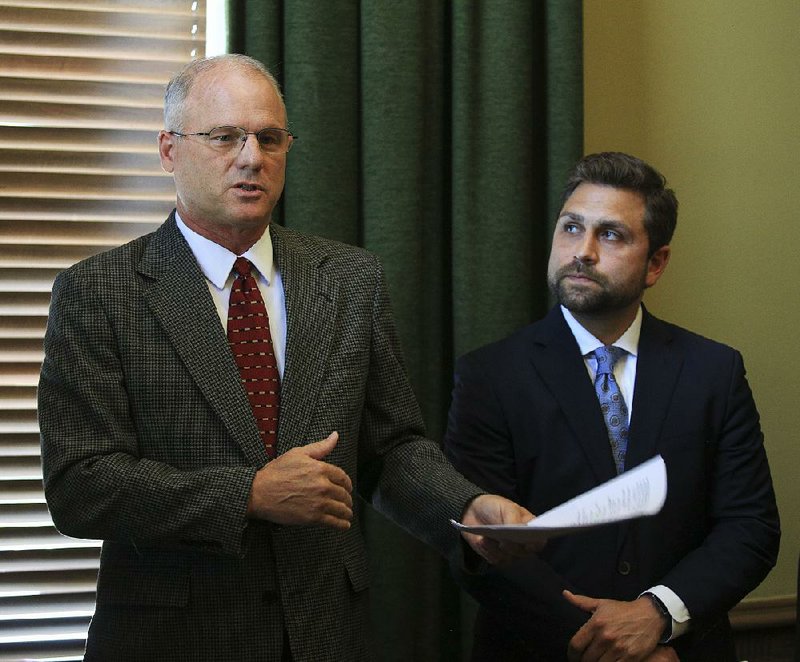Members of the Legislature's tax overhaul task force said Thursday that they want to find out whether Arkansas should change two tax credits authorized for insurance companies at a revenue cost of about $77 million a year.
It's the Tax Reform and Relief Legislative Task Force's latest attempt to scrutinize existing tax credits and exemptions with an eye toward trying to finance a larger income-tax cut than the state could otherwise afford by relying only on increased tax revenue from economic growth and savings through state government budget reductions.
Last spring, because of rising political opposition, the task force scrapped the idea of repealing the reduced sales tax on groceries and helping low-income Arkansans by creating an earned-income tax credit. The increased revenue from higher grocery sales taxes would have been used to pay for income-tax cuts.
Led by Senate President Pro Tempore Jonathan Dismang, R-Searcy, some task force members on Thursday questioned the benefits of a decades-old law that allows for life, health and disability insurers, including health maintenance organizations, to get a home office credit against their insurance premium taxes. The credits are equal to the noncommissioned salaries and wages of the insurers' Arkansas-based employees who are paid in connection with their insurance operations.
For health and disability insurers, the home-office credits may not reduce their insurance premium taxes by more than 80 percent, according to the Insurance Department. For life insurers, the credit may not reduce their premium taxes by more than 70 percent. The home-office credits cost the state $60.5 million in calendar year 2017, the department said.
Dismang and other task force members also wondered about the success of a different tax credit law sponsored by then-Rep. Darrin Williams, D-Little Rock. Dismang was the Senate sponsor of the 2013 law.
Under the 2013 law, property and casualty, life and disability insurers are authorized a tax credit against premium insurance taxes for investments made by qualified community development entities in businesses in low-income areas. The credits are sold by these entities to insurers. The credits may not exceed the insurance premium taxes and may be carried forward for nine years, the Insurance Department said. These so-called new market jobs credits cost the state $16.4 million in calendar year 2017, the Insurance Department said.
The home office and new market jobs credits are the two largest out of the $79.6 million cost of all tax credits against insurance premium taxes in calendar year 2017, according to the department.
In fiscal 2018, the state collected $212 million in insurers' premium taxes, the department said.
A task force co-chairman, Sen. Jim Hendren, R-Sulphur Springs, said of the home office and new market jobs tax credits, "we really haven't got a demonstration that they produce economic activity."
He then referred to how the reduced revenue could be applied to a cut in the individual income-tax rate.
"That $77 million could the drop the top [individual income tax rate] four-tenths of a point from 6.9 [percent] to 6.5 [percent], so which is more effective for economic policy and for business recruitment and to create jobs?" Hendren asked Arkansas State Chamber of Commerce President Randy Zook.
In response, Zook quipped: "I have got a quick calculation of how much in my membership dues that I am going to forfeit ...
"Anything you do to bring down the marginal rates will make Arkansas more competitive," he said. "I am not pretending to be an expert in insurance competitiveness or whatever, but I think the data will give you the answer."
"I would agree the data should give us the answer," Hendren said. But, he said, "That's part of my frustration.
"We come down here and [testify] we are taxing everything and are a high tax state and we have got to protect all these tax credits," Hendren said.
Zook replied that he worked with state officials to enact a 2017 law that phases out the Invest Arkansas tax-credit program in exchange for providing a sales-tax exemption for manufacturers on purchases related to repairing machinery and equipment.
"It's like your opportunity with [the current five-year period for] net operating loss carry-forward" for corporations, Zook said. "We are hopelessly out of step."
The state could increase the five-year carry-forward period for net operating losses for a year in each of the next five years and see what happens with a 10-year carry-forward period, he said.
Then Sen. Missy Irvin, R-Mountain View, said the new market jobs tax credit "sounds like something that we are going to be rewarding people from here if they create a new job or open up a new market.
"That title is pretty misleading," said Irvin, who voted for the 2013 law that created the credit. That law sailed through the Senate in a 33-1 vote and the House in an 85-2 vote, according to the General Assembly's website.
"I appreciate the dilemma y'all face. It is really challenging to try to figure out how to balance the budget and move us toward a more competitive [tax system]," Zook said.
"We are not competitive," he said. "We are just way behind in terms of making ourselves as competitive and as compelling and as attractive as possible. We have got some boxes to check and one of them is tax reform. We need smarter, wiser, more accommodating tax policy."
The new market jobs tax credit program has an end, referred to a "sunset," according to Kurt Naumann, director of research for the Arkansas Economic Development Commission.
"It is over. There will be not any new credits that are being issued," Naumann said. "There are no applications being received. The credits that were issued were done so in accordance with a piece of legislation that [the Arkansas Economic Development Commission] did not sponsor, which was not in our package.
"We are given the requirements to administer the program, which we did. The credits are phased in over a seven-year period," Naumann said. "I don't know what the ramifications would be about trying to rescind any of the benefits that have been approved at this point in time."
He said he would provide information to the task force during its next meeting in October about the investments and jobs created through the program.
After the task force's meeting, Arkansas Blue Cross and Blue Shield spokesman Max Greenwood said the home-office tax credit, which was authorized by a 1987 law, is "an economic development tool" so insurance companies stay in Arkansas and create jobs.
"We have used it and increased our workforce" from 1,795 to more than 3,000 during the past nine years, Greenwood said in an interview.
The company paid $193 million in employee salaries in 2016, while the employees paid $9.3 million in state income taxes, she said.
"If they take away the credit, it is going to increase our premiums and increase the tax burden," she said. "It will become a business decision whether we can expand our workforce locally or look to more favorable [locations]."
During Thursday's meeting, Hendren told the task force that it will continue working over the next three months on drafting legislation reflecting its recommendations to collectively reduce net tax revenue by roughly $400 million a year. That includes whether to merge the draft bills into one package and how to recommend that tax cuts be implemented. The election is Nov. 6 and the next regular session of the Legislature, when tax changes would be made, starts Jan. 14.
Gov. Asa Hutchinson's latest proposal to cut the state's top individual income-tax rate would phase in a reduction of that rate from 6.9 percent to 5.9 percent, cut the number of individual income tax tables from three to one, and increase the standard deduction for both single and married taxpayers. The plan would cost an estimated $192 million a year. The Republican governor's proposal would also increase individual rates for some taxpayers, but the increased standard deduction would mean no taxpayers would pay more in taxes, according to state officials.
A Section on 09/28/2018

